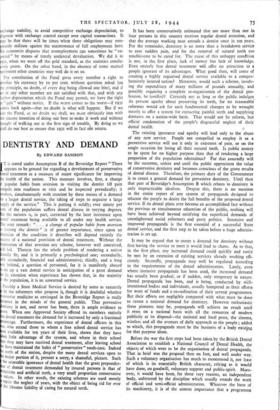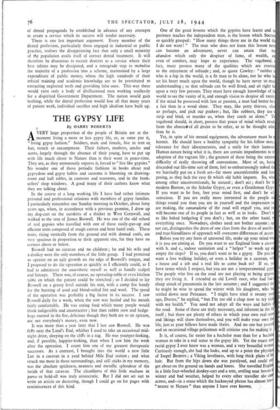DENTISTRY AND DEMAND
By EDWARD SAMSON
T is stated under Assumption B of the Beveridge Report "There appears to be ground for regarding a development of• preservative ental treatment as a measure of major significance for improving e health of the nation. This measure involves, first, a change
f popular habit• from aversion to visiting the dentist till pain ompels into readiness to visit and be inspected periodically.; it volves, simultaneously with creation by these means of a demand r a larger dental service, the taking of steps to organise a large pply of the service." This is putting it mildly; ever ninety per ent. of the population suffers dental disease in varying degrees. ut the meiosis is, in part, corrected by the later insistence upon ental treatment being available to all under any health service. he next remark: " . . a change of popular habit from aversion visiting the dentist" is of greater importance, since upon an Iteration of the condition it describes will depend entirely the ccess of a national provision of dental treatment. Without the limination of that aversion any scheme, however well conceived,
• ill fail. Therein lies the whole problem of rendering a nation entally fit; and it is primarily a psychological one; secondarily, my secondarily, financial and administrative; thirdly, and a long ay behind, a question of personnel, for it is manifestly absurd set up a vast dental service in anticipation of a great demand its attention when experience has shown that, in the majority the population, it is an unwanted service.
Possibly a State Medical Service is desired by some as earnestly by the reformers who propose it, though it is doubtful whether reventive medicine as envisaged in the Beveridge Report is really emost in the minds of the general public. That preventive entistry is not, and never has been, there is ample evidence to ove. When one Approved Society offered its members entirely ee dental treatment the demand for it increased by only a fractional rcentage. Furthermore, the experience of dental officers in this ar, who attend those to whom a free school dental service has en available for ten years of their lives, shows that they have ken little advantage of the system, and where in their school Ys they may have received dental treatment, after leaving school w• have maintained the habit of " preservative" tooth-Care. Indeed teeth of the nation, despite the many dental services open to e major portion of it, present a sorry, a shameful, picture. Such the miserable ignorance of dental health that the great preponder- ce of dental treatment demanded by insured persons is that of tractions and artificial teeth, a very small proportion conservative values. In other words, the existing schemes are used mostly repa;r the neglect of years, with the object of being rid for ever the irksome liability of caring for natural teeth. It has been conservatively estimated that not more than one in four persons in this country receives regular dental attention, and that the average working man attends a dentist once in ten years. For the remainder, dentistry is no more than a breakdown service to ease sudden pain, and for the removal of natural teeth too troublesome to be cared for. The cause of this unhappy condition is not, in the, first place, lack of money but lack of knowledge. Even entirely free dental treatment will offer no attraction to a people ignorant of its advantages. What good then, will come of creating a highly organised dental service available to a compre- hensively insured nation? Moreover, would such a scheme, involv- ing the expenditure of many millions of pounds annually, and possibly requiring a complete re-organisation of the dental pro- fession, be justified? Certainly not as long as the public indulges its present apathy about preserving its teeth, for no reasonable reformer would ask for such fundamental changes to be wrought merely to offer a system for extracting painful teeth and supplying dentures on a nation-wide basis. That would not be reform, but official condonation of the people's disgraceful neglect of their dental health.
The existing ignorance and apathy will lead only to the abuse of any new service. People not compelled to employ it as a preventive service will use it only in extremes of pain. or on the single occasion for losing all their natural teeth. Is public money to be spent for no higher purpose than that of rendering a large proportion of the population edentulous? For that assuredly will be the outcome, unless and until the public appreciates the value of conservative dentistry and becomes conscious of the grave results of dental disease. Therefore, the primary duty of the Government is to create a general demand for preventive dentistry. Until then that part of Beveridge's Assumption B which relates to dentistry is only impracticable idealism. Despite this, there is no mention in the entire report of any system of propaganda designed to educate the people to desire the full benefits of the proposed dental service. If its dental plans ever become an accomplished fact without the previous or simultaneous education of the public, nothing will have been achieved beyond satisfying the superficial demands of unenlightened social reformers and party politics. Intensive and improved propaganda' is the first essential of a successful State dental service, and the first step to be taken before a huge adminis- tration is set up.
It may be argued that to create a demand for dentistry without first having the service to meet it would lead to chaos. As to that, in the first place, any increased demand could quickly and easily be met by an extension of existing services already working effi- ciently. Secondly, propaganda may well be regulated according to the requirements of the dental administrators. Lastly, even where intensive propaganda has been used, the increased demand has usually been gradual, or if sudden, only temporary in nature. Dental propaganda has been, and is being, conducted by well- intentioned bodies and individuals, usually hampered in their efforts for want of funds and a co-ordination of their several programmes. But their efforts are negligible compared with what must be done to create a national demand for dentistry. However enthusiastic these pioneers may be, propaganda will achieve no result until it rests, on a national basis with all the resources of modern publicity at its disposal—the national and local press, the cinema, wireless and all the avenues of daily approach to the people ; added to which, this propaganda must be the business of a body existjng for that purpose alone.
Before the war the first steps had been taken by the British Dental Association to establish a National Council of Dental Health, the objects of which were to be the organisation of dental propaganda. That in brief was the proposal then on foot, and well under way. Such a voluntary organisation has much to recommend it, not least of which is its essentially British character, relying as it would have done, on goodwill, voluntary support and public-spirit. More- over, it would have been, for these very reasons, an independent body, unfettered by the discipline which usually retards the work of official and semi-official administration. Whatever the form of its machinery, it is of the utmost importance that a programme
of dental propaganda be established in advance of any attempts to create a service which its success will render necessary.
There is one last important argument. Every member of the dental profession, particularly those engaged in industrial or public practice, realises the disappointing fact that only a small minority of the population avails itself of correct dental treatment. It will therefore be disastrous to recruit dentists to a service where their best talents may be dissipated, and a retrograde step to mobolise the majority of a profession into a scheme, maintained by a large expenditure of public money, where the high standards of their ethical training and academic knowledge are to be prostituted to extracting neglected teeth and providing false ones. This way there would exist only a body of disillusioned men working soullessly for a dispirited Government Department. The nation would gain 'nothing, while the dental profession would lose all that many years of patient work, individual sacrifice and high idealism have built up.



























 Previous page
Previous page